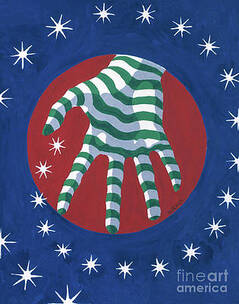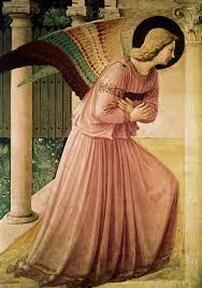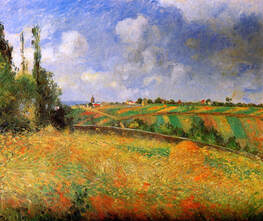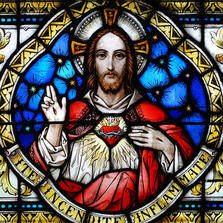 "And this he shall write on his hand, 'The Lord's.'" (Is. 44:5) "And this he shall write on his hand, 'The Lord's.'" (Is. 44:5) On a trip to South Carolina I had the opportunity to tour historic Charleston. Part of the tour included walking on a pathway made from 200 year old bricks, some of which had tiny handprints embedded in them. These handprints are those of the children who made them; that is, the bricks were made by children who were enslaved. While children are known to enjoy leaving their handprints in wet cement, or in this case wet clay, it is obvious that these prints were not made for playful reasons. Most of them were probably made unintentionally, but it seemed to me that some of the handprints were perhaps left as a way of letting others know that they wanted to be remembered, to have their lives be noticed and given the dignity they deserved. Whatever the reasons, the handprints are a reminder that no matter what, we are always within the sight of God. Jesus taught His followers that although we may endure hardship in this life, God is with us and we will have joy in heaven with Him. However, it remains that while in this life, we all have a basic need to be validated and to know we are important to someone. Even though we know God sees us, we still yearn to be treated with dignity, to be noticed, valued, and to not be forgotten. But no matter what happens, we can cling to what Jesus told us: every hair of our head is counted and therefore we are never forgotten by God even for a fraction of a second. He is always surrounding us with His love and mercy, especially when we feel it least and need it most.  "We are made little less than the angels" "We are made little less than the angels" In regard to this, Psalm 8 is fitting, especially because the writer seems to understand not only the dignity of each person, but also that every human glorifies God simply by existing. The Psalmist expounds on the beauty of the heavens, the moon and the stars, and then asks, “What are we that you should be mindful of us?” That is, God made all the beauty of the heavens and the earth, and yet deems us more important than these, perhaps as more beautiful than the rest of creation. The tiny handprints on the bricks can be a reminder that all of us are made “little less than the angels… crowned with glory and honor.” In Psalm 139 we read that God knows “when I sit and when I stand; you understand my thoughts from afar…. If I go to the heavens, you are there; if I sink to the nether world, you are present there. …if I settle at the farthest limits of the sea, even there your hand shall guide me and your right hand hold me fast.” (Psalm 139: 2, 8-10) God made us for more than one reason: of course, He made us simply because He loves us, but He also made us to contribute something to the rest of humanity, no matter how great or small, how seen or unseen by others.  "Are not five sparrows sold for two small coins?" "Are not five sparrows sold for two small coins?" In Luke’s Gospel, Jesus went into great detail about how God sees and cares for us.* He said, “Are not five sparrows sold for two small coins? Yet not one of them has escaped the notice of God. Even the hairs of our head have all been counted. Do not be afraid.” (Luke 12:6-7) The key is in taking to heart the last line: “Do not be afraid.” Indeed, we are always within His vision, but it takes radical trust to accept this. That Jesus repeats this assurance many times throughout His ministry and even after the Resurrection should be evidence enough that He really wants us to trust Him and therefore, to be at peace. Everything is in God’s hands and thus, His love and mercy are gifts to be savored. Once we accept in our heart that we are so loved by God, however, Jesus outlines the ways in which we are to do for others what God does for us. This means we are to be a witness to our faith unapologetically, that is, to live what we have been taught, and in all things act with love. To be a follower of Jesus means that ‘what we are given without cost we are to give as a gift.’ (Paraphrase of Matthew 10:8) Therefore, we need to look past our own selves, trusting that we are completely in God’s care, and with love, look to help others who may have great needs or perhaps who simply want to be noticed and remembered for the beauty of being our brother or sister.  The beautiful handiwork of God. The beautiful handiwork of God. The Church dedicates the entire month of June to the Sacred Heart of Jesus, a celebration of His unfathomable love.** In light of this, it is good to reflect upon the love we have received and the actions of love to which we are called. Reading and praying with the Sermon on the Plain and the other Gospel discourses of Jesus, particularly in Matthew and Luke, would be helpful as a reminder of how loved we are and how we are enjoined to love others as we are loved. God’s loving handprint is on each of His children, and in a similar way we, too, are called to leave an imprint of love, no matter how small it may seem, upon everyone we encounter. And if we do so, we will see the beautiful handiwork of God ever more clearly as we build the Kingdom with Him, one loving act at a time.  May the fire of Jesus' love burn in our hearts! May the fire of Jesus' love burn in our hearts! May we pray that the fire of love that burns within the Sacred Heart of Jesus would also burn in our hearts! May we live in the dignity with which we were created and acknowledge that same dignity in all our brothers and sisters! And may we be moved to put love into action through works of mercy and compassion! Let us meet in the Sacred Heart of Jesus! Peace! ©Michele L. Catanese *The discourses in Luke’s Gospel and in Matthew’s Gospel share the same basic content, particularly the Sermon on the Plain and the Sermon on the Mount, respectively. For those who wonder why Matthew set this discourse on a mountain side and Luke did not: Matthew was writing to an audience of Jewish converts who were very familiar with God’s revelations upon mountains, especially when He gave the Law to them. This was representative of God as being on high and so they had great reverence for God’s revelation in this way. For Luke’s Greek convert audience a mountain setting would have been too intimidating; they would have wanted nothing to do with it because mountain revelations meant trouble. Remember, in Greek mythology the gods lived on Mt. Olympus and they did nothing but wreak havoc on humanity to accomplish their own selfish ends. Thus, to set this important discourse on a plain was symbolic of God ‘making level the field’ so to speak, entering into our world in a non-intimidating and radical way. However, the quote used above from Luke is found in a later discourse, the content of which Matthew used in the Sermon on the Mount. Simply, the authors organized their gospels differently to reach out to their different audiences. **June 24 is the Solemnity of the Most Sacred Heart of Jesus, but it is traditional for the entire month to be dedicated to this devotion. Images: 1. Painted image, Isaiah 44-5, Fr. William Hart McNichols. If you are interested in obtaining this image in one of a variety of formats, it can be found at https://fineartamerica.com/featured/isaiah-44-5-william-hart-mcnichols.html 2. Painting, inset of the Archangel Gabriel from The Annunciation, Blessed Fra Angelico. 3. My photo, taken in Hawaii. (I know it is not a sparrow, but it works.) 4. Painting, Fields, 1877 by Camille Pissarro. 5. My photo of stained glass, Sacred Heart of Jesus. Note: In compliance with GDPR rules, I wish to make it clear that I do not gather any information on any of my readers at any time. Comments are closed.
|
Heart Speaks to Heart
|

 RSS Feed
RSS Feed

